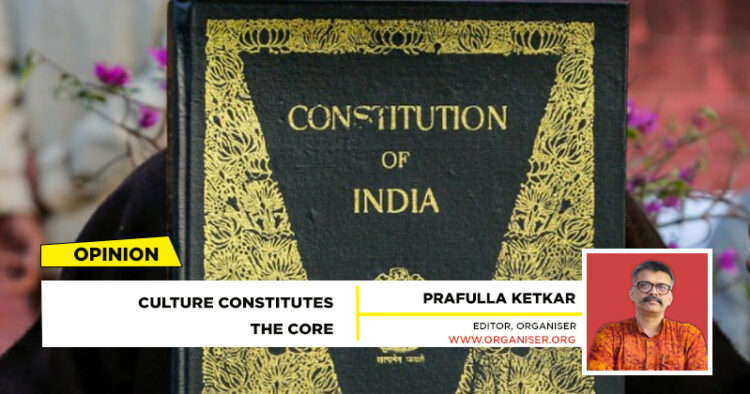“Our reactions to government decisions or expressions of discontent must heed national integrity. We should be sensitive towards people of all religions, regions, castes and linguistic backgrounds and conduct ourselves within constitutionally warranted limits. Unfortunately, those misaligned with or opposed to our socio-cultural values have, while professing to be the champions of democracy, Constitution and secularism, continued to fool and confuse the people of our country. In his August 29, 1949 address to the Constituent Assembly, Revered Dr Bhimrao Ambedkar used the phrase “grammar of anarchy” to describe the actions of such elements. We have to learn to identify such disguised elements and defuse their conspiracies by alarming and alerting our brothers and sisters so that they cannot be shepherded away by such predators.” – Dr Mohan Bhagwat, Sarsanghchalak Rashtriya Swayamsevak Sangh, in his Vijayadashmi speech at Nagpur on October 25, 2020
The Constitution of Bharat is the most dynamic and evolutionary document and can be considered Geeta of social transformation through democratic means. Since 1789, when the Constitution of the United States came into force as the first written Constitution, it has been amended 27 times. Of them, the first ten amendments, the Bill of Rights, were introduced in one go. In contrast, the Constitution of Bharat has been amended 105 times to date, and many crucial bills are in the pipeline. Still, most people consider the fundamental law of the land sacrosanct and do not accept any tampering with the same. This change with continuity has been a remarkable achievement of our Constitution in the last 74 years since its adoption on November 26, 1949. When entering into the Amrit Mahotsav of the Constitution, we need to analyse and appreciate the core character of the Constitution envisioned and codified by the makers of the Constitution.
After the struggle for centuries against colonial rule, coming together and framing the Constitution was a humongous task. It was the legacy of our freedom struggle and the conviction of the Constitution makers, due to which this comprehensive text came into existence. Despite a great degree of differences about continuing with the colonial structures and laws, they deliberated on each and every provision. They adopted modern structures while keeping the civilisational ethos in mind. Even at the time of adoption, many members of the Constituent Assembly were not satisfied with the many characteristics of the Constitution, especially the centralised nature, yet they endorsed the collective wisdom and allowed future generations to make the necessary amendments.
What they deliberated upon about the nomenclature of Bharat, structure of Gram Swaraj, Bharatiya concepts of rights and duties, the idea of Ram Rajya, equal respect for all ways of worship as the core civilisational principle, cow protection still constitute our guiding principles. The legal text resulted from the discussion among the Constituent Assembly members and various stakeholders’ views and inputs. The tradition of dialogue, discussion, persuasion and inclusion was the key to our Constitution-making process. The creation of our Constitution is a delicate balancing act – rigidity and flexibility, individuality and social groups, rights and duties, centralisation and decentralisation, traditions and modernity, are interwoven and balanced without the approach of binaries. The objectives of the Constitution making were not deterministic but open, where the will of the people would remain supreme. Because of this openness, our Constitution is agile and could successfully overcome the challenges posed by separatism, Maoism, Emergency and coalition politics. The recent decisions on Article 370 by the Government and on Ayodhya by the Supreme Court indicate that if there is a will and intent, we can resolve any issue within the framework of the Constitution.
Dr Babasaheb Ambedkar, as Chairman of the Drafting Committee, ensured that social change and transformation should occur through democratic means, while talking about the rights and equitable opportunities for social groups. He ensured that individual rights are not trampled upon. For him, liberty and equality cannot be complete without the feeling of fraternity. That sense of fraternity is the basis of nationhood. Along with the sense of common ancestry and dedication to the sovereign idea of the motherland, we need to strengthen the commitment to Fundamental Duties towards the rights of our ancient nation with modern structures while celebrating the Amrit Mahotsav of the Constitution. The confusion created by the colonial rulers about who we are and what constitutes our nationhood should be cleared as early as possible. We have made a remarkable journey from a mother of democracy to the largest democracy in the world. For ages, we have experimented with democratic decision-making and gifted a unique dimension, spiritual democracy, to the world. That spirit of Ekam Sat Viprah Bahudha Vadanti is our Constitution’s real cultural basic structure. While remaining open and flexible about the necessary changes, how to remain committed to the core of our Constitution should be our prime concern in the Amrit Kaal.




















Comments